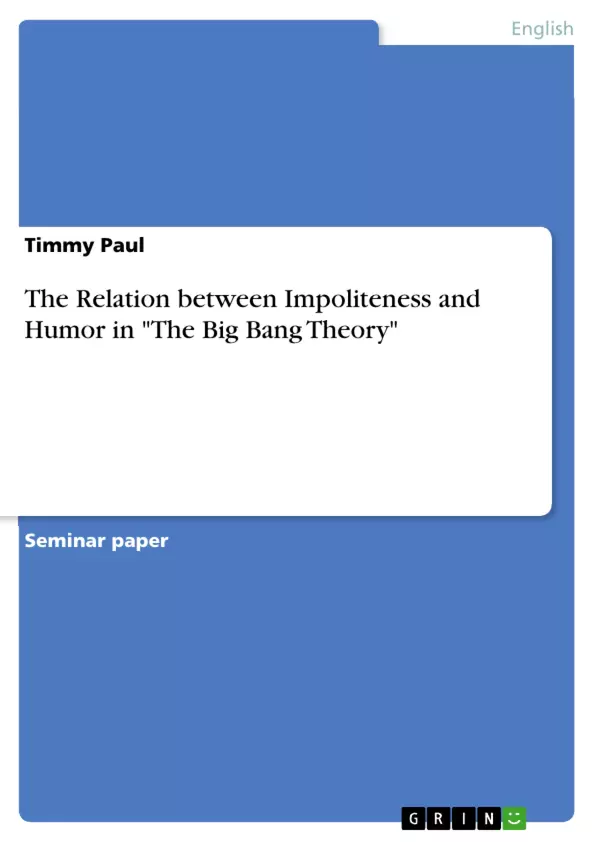This research paper focuses mainly on the relationship between impoliteness and humor in comedy series. In the following I will name the research questions I'm dealing with in this paper. What makes the character Sheldon Cooper a funny character? How is it possible for an almost misanthropic character like him to create humor and to entertain an audience? What are the reasons for his impolite nature and in what way are they presented? My hypothesis is that The Big Bang Theory uses impoliteness and power relations to create a specific type of humor, which is able to make even an antisocial character likable and congenial. In order to test my hypothesis, I reviewed the Politeness Strategies by Brown and Levinson (1978) and the Impoliteness Strategies by Culpeper (2005). Furthermore I made researches about the connection between power and impoliteness and their relation to humor. During the procedure I matched the received information with inserted data from the sitcom in order to learn about their effects on spectators. Based on the findings I received during my research, one can say that the combination of impoliteness and power leads under specific conditions to amusement and enjoyment within the audience. Taking into account different factors, can turn an offensive utterance or even a conflict between two or more people into a tool of humor and thus cause delight for observers. The main conclusions of this paper are, that Sheldon Cooper's behavior perfectly matches the Impoliteness Strategies by Culpeper (2005), that power plays a significant role in creating impoliteness and that impoliteness and conflict are strongly connected to humor.
Inhaltsverzeichnis (Table of Contents)
- Abstract
- Introduction
- Definition of Linguistic Humor, Politeness and Impoliteness
- Linguistic Humor
- Politeness, Nonpoliteness and Impoliteness according to Leech
- Politeness Strategies by Penelope Brown and Stephen C. Levinson
- Impoliteness Strategies by Jonathan Culpeper
- Data and Analysis of Specific Conversational Fragments, Jokes and Punchlines from The Big Bang Theory
- Power and Impoliteness in The Big Bang Theory
- Impoliteness and Entertainment
- Conclusion
Zielsetzung und Themenschwerpunkte (Objectives and Key Themes)
This research paper investigates the connection between impoliteness and humor in the context of comedy series. The study examines the character Sheldon Cooper from The Big Bang Theory, analyzing the reasons behind his impolite nature and the way this contributes to humor in the show. It aims to understand how impoliteness, power relations, and specific communication strategies create a unique form of humor, making even an antisocial character likable and entertaining.
- The relationship between impoliteness and humor in comedy series
- The analysis of the character Sheldon Cooper in The Big Bang Theory
- The role of power and impoliteness in creating humor
- The application of politeness and impoliteness theories to analyze comedic interactions
- The impact of humor on the audience's perception of characters
Zusammenfassung der Kapitel (Chapter Summaries)
- Abstract: This chapter presents the research questions, hypothesis, and methodology of the study. It highlights the focus on the relationship between impoliteness and humor in comedy series, specifically using The Big Bang Theory as an example.
- Introduction: This chapter provides background information about the prevalence of sitcoms in today's television programming, focusing on the use of impoliteness and conflict as humorous elements. It introduces The Big Bang Theory and the character of Sheldon Cooper as the subject of analysis, emphasizing the importance of understanding the communication strategies used and their impact on the audience.
- Definition of Linguistic Humor, Politeness and Impoliteness: This section explores different definitions of linguistic humor, politeness, and impoliteness, offering insights from various researchers and theories. It highlights the importance of understanding these concepts for analyzing comedic interactions and the specific case of Sheldon Cooper's behavior.
- Data and Analysis of Specific Conversational Fragments, Jokes and Punchlines from The Big Bang Theory: This chapter delves into specific examples from The Big Bang Theory, analyzing conversations, jokes, and punchlines that demonstrate the connection between impoliteness and humor. It uses the theoretical frameworks presented in the previous chapter to interpret the chosen data and provide a deeper understanding of the mechanisms at play.
- Power and Impoliteness in The Big Bang Theory: This section examines the role of power dynamics in creating and understanding impoliteness in the sitcom. It analyzes how power relations influence comedic interactions, focusing on the character of Sheldon Cooper and his social standing within the group.
- Impoliteness and Entertainment: This chapter explores the connection between impoliteness and entertainment, investigating how offensive utterances and conflicts can become sources of amusement for the audience. It analyzes the specific factors that transform potentially negative interactions into humorous moments, contributing to the overall enjoyment of the sitcom.
Schlüsselwörter (Keywords)
This research paper focuses on the relationship between impoliteness and humor in comedy series, specifically using The Big Bang Theory as an example. The study investigates the character Sheldon Cooper, analyzing his use of impoliteness strategies, power dynamics, and the impact of his behavior on the audience's perception of humor. Key terms and concepts include: impoliteness, humor, comedy, sitcom, politeness strategies, power relations, communication systems, and The Big Bang Theory.
- Quote paper
- M.Ed. Timmy Paul (Author), 2017, The Relation between Impoliteness and Humor in "The Big Bang Theory", Munich, GRIN Verlag, https://www.grin.com/document/1169259



